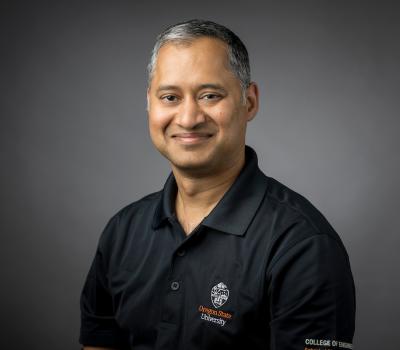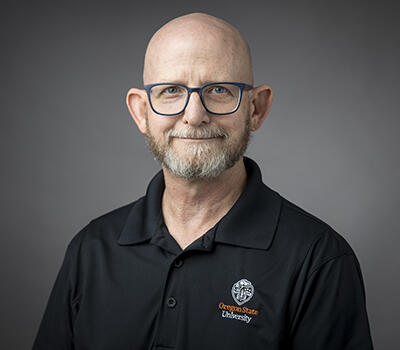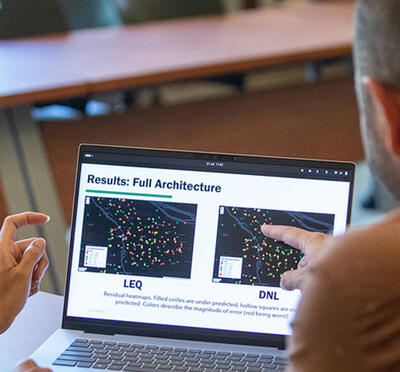In December 2022, Abi Whittle was holding down two jobs and taking a full load of classes in the College of Engineering at Oregon State University. Then she read about a scholarship, being offered for the first time at the college, intended specifically for students like her: computer science majors following the cybersecurity track. She applied and was selected from nearly 35 applicants as one of five students to join the university’s first cohort of Scholarship for Service recipients.

“I had been struggling to get scholarships for a long time, and I was struggling to pay tuition and rent,” Whittle said. “Now, I no longer have to work to the pay the bills. It’s nice to finally get a break and just breathe and focus completely on my studies.”
The Scholarship for Service program was established more than 20 years ago by the National Science Foundation and the Department of Homeland Security. Its purpose is to give students the tools they need to become cybersecurity experts and step into public sector jobs immediately after graduating. Oregon State’s scholarships are funded by a five-year, $4.8 million grant from the NSF.
“There’s a huge shortage of professionals in cybersecurity, especially in government,” said Dave Nevin, an assistant professor of practice in the College of Engineering and director of ORTSOC, the college’s security operations center, where professionally guided students provide cybersecurity services to regional underserved organizations. “The scholarship offers students a wonderful opportunity to ease their financial concerns and jump into very important jobs once they graduate.”

SFS students receive tuition for up to three years, as well as a $6,000 annual stipend to cover conferences, job fairs, and other professional development activities. After graduating, they’re required to go to work for a federal, state, local, or tribal government agency or other approved institution for a period equal to the length of their scholarship. After fulfilling that obligation, they are free to choose any career path. Common destinations for SFS students include the FBI, the Department of Energy, and national laboratories.
For a university to offer SFS, it must have a strong academic program in cybersecurity, and Oregon State has come a long way in a short time, including making the one-year ORTSOC practicum mandatory for computer science majors on the cybersecurity track.
“Oregon State has steadily expanded and enhanced its cybersecurity curriculum over the past decade,” said Rakesh Bobba, associate professor of computer science, who worked closely with Nevin to attract SFS funding to the university. Nevin and Bobba describe ORTSOC as “the country’s first cybersecurity teaching hospital.” Under expert guidance, students serve real-world clients who don’t have the budget for robust cybersecurity programs.
ORTSOC students spend 10 to 12 hours a week progressing through a series of “clinical rotations,” each addressing different operational areas, such as network security monitoring, threat hunting and assessment, vulnerability scanning, and remote incident response. They assess their clients’ security weaknesses, monitor their networks for malicious activities, and strengthen them against cyberattacks. Clients include two small city governments, a county government, two educational service districts, two community colleges, a software project hosting organization, and others that will join soon. According to Nevin, demand for ORTSOC’s services continues to grow quickly.
“The type of experiential learning that we offer students through ORTSOC is truly special,” Bobba said. “We believe we’re the first in the nation to fully integrate a security operations center into the degree curriculum.”
He added that a sizable number of students have already considered working in government. SFS student Jacquelyn Sansone, a second-year computer science major, first thought about joining the FBI when she was in her first year of high school. Last year, she reached out to the person in charge of cybersecurity at the Sacramento FBI office to find out more about the work.
“Cybersecurity is a growing field with lots of opportunities, and it’s something people don’t think about very much until something goes wrong,” she said. “I want to be one of the people who stop the threats. Plus, I think it’s important for more women to go into STEM fields.”
When Cassie Hedrick applied for the scholarship, she was a third-year student living in Pasco, Washington, pursuing a computer science degree through Oregon State Ecampus and interning at the nearby Pacific Northwest National Laboratory.
“Trying to balance paying my mortgage, going to school, and working was tough,” Hedrick said. “I’m 32 years old, so I’m a nontraditional student, and I have a disability,” Hedrick said. “I had come to terms with what my life would look like after college, but the scholarship changed everything. I thought all the doors to new opportunities had closed, and now they’re wide open again. SFS has been life-changing.”





